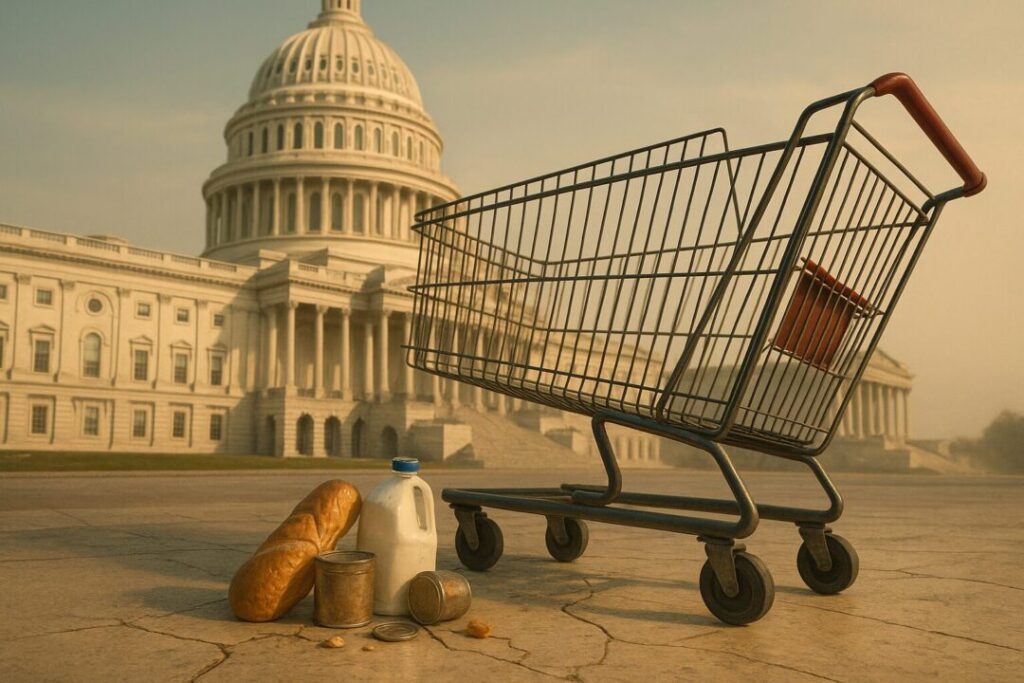In July, Congress passed President Trump’s “One Big Beautiful Bill.” It’s a massive package. It extends tax cuts, trims waste, and makes changes to big federal programs.
One of the biggest targets? The Supplemental Nutrition Assistance Program—better known as SNAP or “food stamps.”
And yes, the changes are big.
The bill trims federal SNAP spending by $186 to $230 billion over the next ten years. That’s the largest cut since the program began.
Supporters say this is about controlling costs. Critics call it cruel.
Rep. Dina Titus (D-NV) was one of those critics.
She voted against the bill, saying it would “pull the rug out from under families who are already struggling to put food on the table.”
Titus argued that the changes will especially hurt seniors, veterans, and low-income families in Nevada.
Before, SNAP’s work rules applied to able-bodied adults up to age 54. Now it’s 64.
Parents with kids 14 or older must also work or meet job-training rules.
The bill also makes it harder for states to skip the rules. Work waivers now only apply in areas with unemployment above 10%.
That’s rare – except when Democrats are in charge.
Up to now, Washington covered all SNAP benefits. States only paid to run the program.
Starting in 2028, states will pay part of the benefits too – up to 15% in some cases. States with more payment errors will pay more.
Conservatives call this “skin in the game.” Critics like Titus say it will push states to cut people off or shrink benefits.
Right now, benefits are tied to the “Thrifty Food Plan” – a formula updated to reflect rising food costs. The bill caps those updates.
Other Changes
– Utility allowance cuts: The way benefits factor in heating and cooling costs will change, reducing payments for about 600,000 households.
– Immigrant eligibility: Only U.S. citizens and lawful permanent residents can get SNAP. Some groups who qualified before will be cut out.
The only people who will lose benefits or see smaller checks are people who won’t meet new work rules or live in states that can’t afford the new costs.
For example, a single mom with one child could drop from $536 a month to $292 if she fails the work test.
State budgets will also take a hit. If states can’t pay their share, they may trim eligibility or even drop out of the program.
Most people on SNAP won’t see an immediate change. Some parts start now. Others roll out over years.
But the direction is clear: smaller federal role, more state responsibility, tighter rules.
For conservatives, this is about reform, not punishment.
Cutting waste and fraud: “Welfare expenditures are out of control. Fraud is rampant… especially in food assistance programs,” says Robert Rector of the Heritage Foundation.
Tighter rules, he argues, mean fewer improper payments and more trust in the system.
Promoting work: Senator Markwayne Mullin (R-OK) puts it bluntly: “We don’t compensate people for laziness in this country. We want to provide opportunities… and a helping hand during tough times.”
The idea is that work rules push able-bodied adults toward jobs instead of long-term dependency.
Controlling spending: SNAP costs have soared. Supporters say the federal budget can’t handle it.
State accountability: If states help pay, they’ll have a reason to run SNAP more efficiently and tailor it to local needs.
Focusing help: Conservatives say narrowing eligibility means more resources for those truly in need.
This fight over SNAP isn’t just about food stamps. It’s about how much the federal government should do – and how much should be left to states and individuals.
Conservatives see the bill as a step toward fiscal sanity and personal responsibility. Opponents like Titus see it as balancing the budget on the backs of the poor.
One thing is certain: these changes will reshape SNAP for years to come. And the debate over how much government help is “enough” isn’t going away anytime soon.
The opinions expressed by contributors are their own and do not necessarily represent the views of Nevada News & Views. This article was written with the assistance of AI. Please verify information and consult additional sources as needed.




